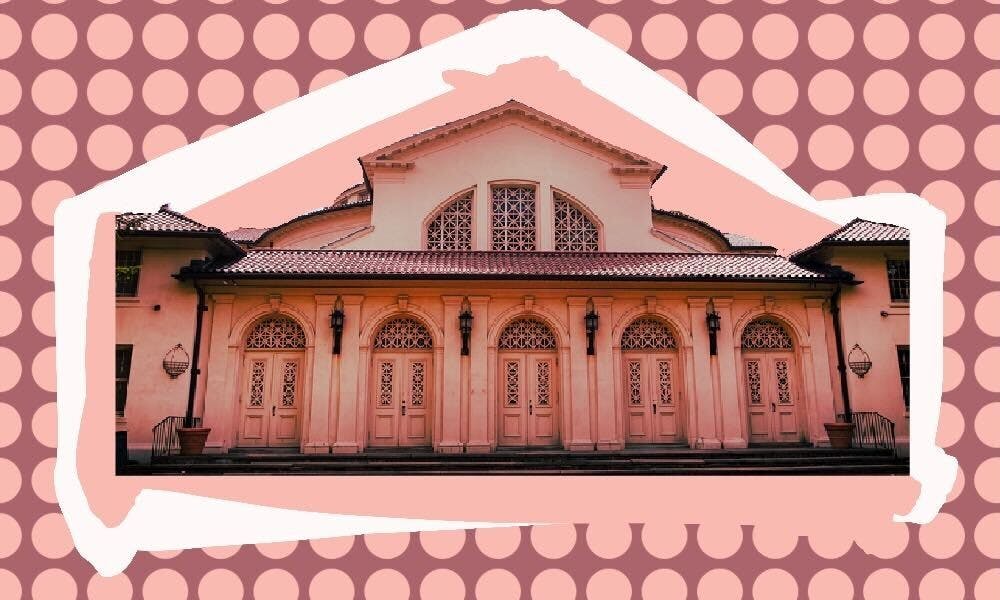When we make art, we tend to focus on the art itself, never the space where it was created.
The Rotunda, at 40th and Walnut, is not only a versatile space for art exhibitions—from multimedia galleries to trapezists—it's been the site of a community. Whether after seeing a movie at the Cinemark or party hopping, almost every Penn student has unknowingly passed The Rotunda, with its iconic, web–like pattern on the windows and clay–colored shingles. Initially a church, The Rotunda has been an artistic venue for almost 30 years now.
Gina Renzi has been the director of The Rotunda and an employee at Penn for almost twenty years. She's seen not only irreplaceable pieces of original art, but irreplaceable stories of Philadelphia's found family. West Philadelphia has always historically been, as Renzi puts it, “... a hotbed for arts and activism.” When you enter The Rotunda’s “main room” (separate from the actual “rotunda” itself), the ceilings are framed with landscape murals of street art combined with tribal art—a line of people holding hands beneath vines to three picket signs asking, "West Philly? University City? Lenape Hawken?" It's a subtle encapsulation of the way art and community values are entwined at The Rotunda.
In 1996, the University purchased the building (which is still in Philadelphia Register of Historic Places). After a series of pitches, professors of an Urban Studies seminar at the time successfully got approval for what would become the Foundation Community Arts Initiative, with their first event being a free, public jazz concert. The Rotunda's status as a home for artists has flourished ever since. However, its original intention of “bridging the gap between Penn and non–Penn communities,” as Renzi describes it, has dwindled since then. At a time when Penn’s role in the gentrification of West Philadelphia is especially contentious, rekindling a relationship with The Rotunda would not only expand Penn’s artistic life, but extend that life to one that coexists and collaborates with West Philadelphia.
One aspect of The Rotunda's communal nature, as Renzi explains, is that “anybody can walk in and put on an event—” a model that is still practiced today. She says its “greatest strength is word of mouth […] without an exact science,” which attracts more people and makes it fully accessible. The Rotunda has not only been the force that allows artists to carry out their visions, but has been the spot of life–changing events for people of the neighborhood.
One artist who used The Rotunda for Afro–rock–and–soul festivals got married on stage and years later, returned with his four children, who performed alongside him. The Rotunda was also one of the first performance spaces for the Alash Ensemble, a Tuvan throat–singing group that emerged out of a technique of singing multiple pitches at once, to echo sounds of nature. Alash has since gone on to perform internationally with numerous record labels, but they still come back to The Rotunda as a community favorite where, Renzi said, “people are clamoring to get in with their faces pressed against the windows.”
These are only two examples, not just of the capacity for personal relationships developed through art at The Rotunda, but of the unlimited scope of art that it can produce. Consider the Bright Bulb Screening Series, where every second Thursday of the month, film artists screen their work with free admission.This celebration of art and community is reminiscent of historical traditions in the Philadelphia art scene, such as First Friday: A monthly, city–wide night where art galleries and studios are open for the public to view. Integrating art with the community is essential to Philadelphia’s culture, and Penn shouldn't isolate itself from that culture, but rather harmonize with the neighborhood.
For artists at Penn with a work of art that needs not only a space, but a home, they should seek out The Rotunda. Because of Penn’s partnership under University of Pennsylvania Facilities and Real Estate Services Arts Portfolio (FRES ARTS), most student groups are not charged for use. Renzi, whom students can reach out to if interested, says that one simply needs a “clear idea of what they want to do.” Art always holds a responsibility to the community receiving it, and trusting The Rotunda ensures art's lasting imprint.







